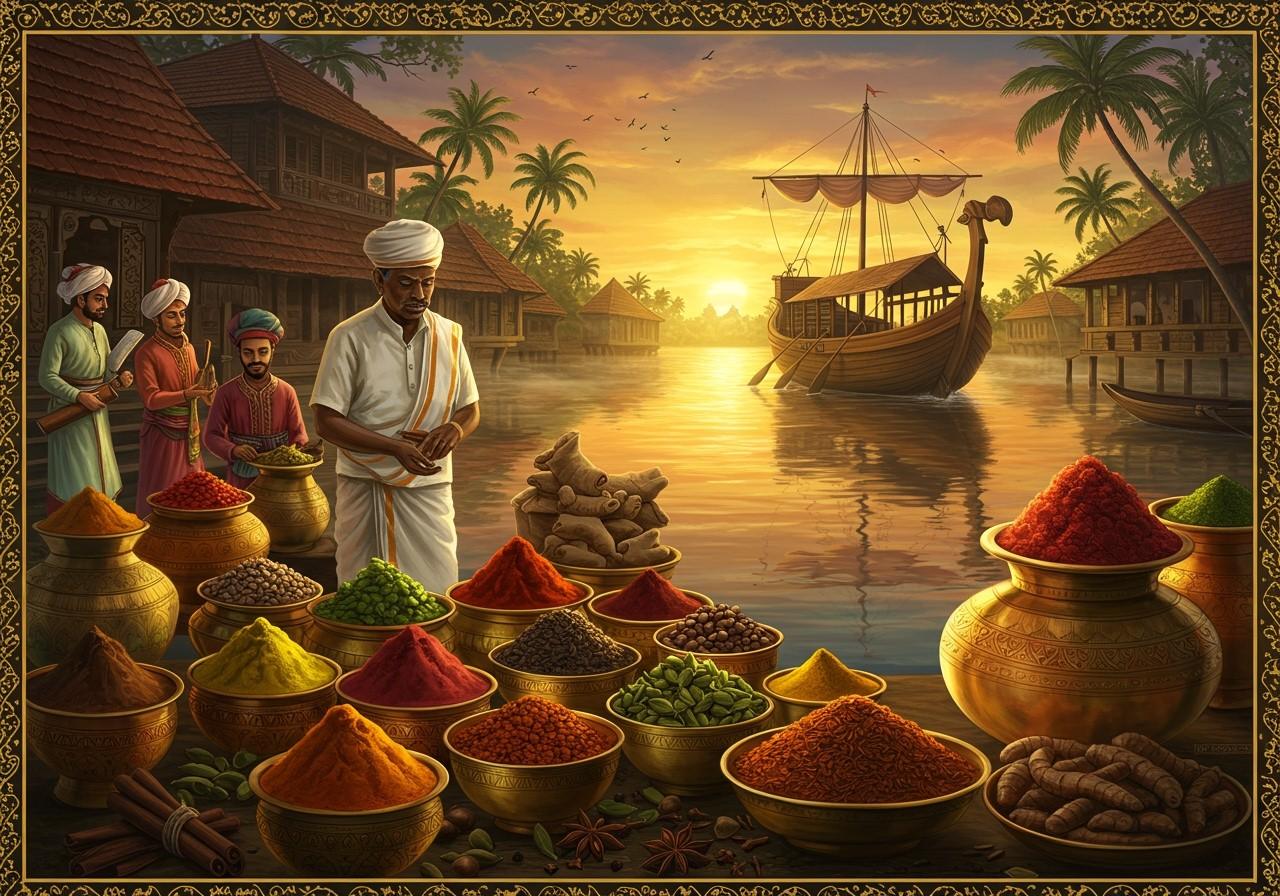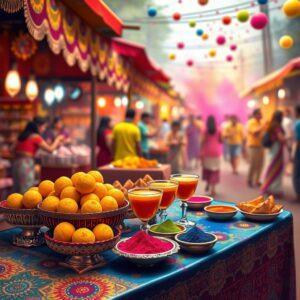
Kerala, often referred to as “God’s Own Country,” is renowned for its breathtaking landscapes, rich cultural heritage, and captivating history. This article delves into Kerala’s prominent role in the global spice trade, exploring its cultural impact and the distinctive cuisine that has emerged from this legacy. Discover how Kerala became the epicenter of the spice trade and its enduring influence on the region’s history, culture, and culinary practices.
Historical Significance of the Spice Trade in Kerala
The spice trade in Kerala has ancient roots, with the region serving as a major hub for spices such as black pepper, cardamom, cinnamon, and turmeric. Its strategic location along the Malabar Coast provided access to traders from across the globe, including Arabs, Chinese, and Europeans. This trade brought significant wealth to Kerala, leading to the growth of important port cities like Kozhikode (Calicut) and Kochi (Cochin).
- Ancient Trade: Early trade routes connected Kerala with civilizations in the Middle East, Asia, and beyond. These routes facilitated the exchange of spices, precious stones, and other valuable commodities, contributing to Kerala’s economic prosperity and cultural diversity.
- Major Spices: Kerala’s fertile land and favorable climate made it ideal for cultivating a variety of spices, including pepper, vanilla, cardamom, clove, cinnamon, nutmeg, ginger, and turmeric. These spices played a crucial role in the global spice trade, attracting merchants from distant lands.
- Port Cities: The spice trade fueled the growth of major port cities like Kozhikode and Kochi. These cities became bustling centers of commerce and cultural exchange, attracting traders, travelers, and scholars from different parts of the world.
- Foreign Influence: The arrival of Portuguese, Dutch, and British traders further shaped Kerala’s history and culture. These colonial powers left their mark on the region’s architecture, language, and social structures, contributing to the unique blend of influences that characterize Kerala today.
The influence of these foreign traders is still visible in Kerala’s architecture, language, and cultural practices.
Cultural Impact of the Spice Trade
The spice trade not only brought economic prosperity but also fostered a rich cultural exchange in Kerala. Traders and travelers from different parts of the world introduced new languages, religions, and customs to the region. This cultural fusion is evident in Kerala’s diverse religious landscape, with Hinduism, Islam, Christianity, and Judaism coexisting harmoniously.
- Religious Diversity: Kerala’s history of trade and cultural exchange has resulted in a diverse religious landscape, where Hinduism, Islam, Christianity, and Judaism coexist peacefully. This religious harmony is reflected in the state’s festivals, traditions, and social fabric.
- Architectural Heritage: Kerala’s architectural heritage showcases a blend of indigenous styles and influences from various cultures. Synagogues, churches, mosques, and traditional Kerala homes exemplify the region’s rich architectural tapestry, reflecting its history of cultural exchange and artistic innovation.
- Festivals: Festivals in Kerala are celebrated with great enthusiasm and reflect the state’s cultural diversity. Onam, Eid, Christmas, and other religious and cultural festivals are observed with equal fervor, showcasing the spirit of unity and inclusivity that characterizes Kerala’s society.
- Art Forms: Kerala’s traditional art forms, such as Kathakali and Mohiniyattam, have been influenced by various cultural traditions. These art forms incorporate elements from different artistic styles, reflecting the state’s rich history of cultural exchange and artistic development.
This cultural amalgamation has shaped Kerala’s unique identity.
Culinary Heritage of Kerala Spices
Kerala’s cuisine is a testament to its rich spice heritage, characterized by the abundant use of locally sourced spices. Dishes like Puttu and Kadala Curry, Appam and Stew, and Malabar Biryani are renowned for their distinctive flavors. These flavors are derived from spices such as black pepper, cardamom, cloves, and cinnamon. Traditional cooking methods, like slow cooking in clay pots, enhance the aroma and taste of these spices. Seafood is a staple in Kerala cuisine, with dishes like Fish Moilee and Chemmeen Curry showcasing the harmonious blend of spices and fresh ingredients.
The influence of foreign traders is also evident in Kerala cuisine, with dishes like the Portuguese-inspired Vindaloo and the Dutch-influenced Kaalan being local favorites. The use of coconut in various forms—grated, milk, and oil—is a hallmark of Kerala’s culinary practices. Spice markets, such as those in Fort Kochi and Mattancherry, offer a glimpse into the region’s vibrant spice heritage.
Poojn.in: Your Source for Authentic Kerala Spices
Poojn.in offers a wide selection of authentic Kerala spices and ritual items essential to the region’s rich traditions. Our collection includes premium Kabab Chini (allspice berries), also known as Shital Chini, a key ingredient in Kerala cuisine and traditional preparations. We offer these spices in convenient PP pouches of 25g, 100g, and 250g sizes. Explore our Kabab Chini collection here.
Poojn.in also offers a variety of other spices essential for Kerala cuisine and rituals. Check out our large-size Elaichi (black cardamom), perfect for adding depth and flavor to your dishes. For those seeking high-quality turmeric, explore our selection of Talmakhana seeds.
We are committed to providing:
- 100% pure spices with no added perfumes
- Traditional packaging to preserve quality
- Pan-India delivery
- Authentic sourcing
- Multiple size options
Contact us at 91 7908548235 for any spice-related inquiries. We ship across India, bringing the essence of Kerala’s spice heritage to your doorstep.
Modern-Day Spice Trade and Economy
The spice trade continues to be a significant part of Kerala’s economy. The state remains a leading producer of spices in India, with its cardamom, black pepper, and nutmeg highly sought after in the international market. The Spice Board of India, based in Kochi, plays a crucial role in promoting and regulating this trade. Kerala’s spice plantations, especially in Thekkady and Wayanad, are popular tourist destinations, offering a firsthand look at spice cultivation. The state government actively supports spice farmers and sustainable agriculture, further boosting the industry and its contribution to Kerala’s economic growth.
Tourism and Spice Trails
Kerala’s spice heritage attracts tourists worldwide. Spice trails through lush plantations and vibrant markets provide immersive experiences. Popular destinations include Munnar, Wayanad, and Thekkady, where guided tours explain spice cultivation, harvesting, and processing. These tours often include cooking demonstrations using fresh spices. The spice trade has also spurred the development of spice-themed resorts and homestays, offering an authentic taste of Kerala’s spice culture.
Conclusion
Kerala’s spice heritage is a vibrant tapestry of history, culture, and cuisine. From ancient times to the present day, the spice trade has shaped Kerala’s identity and influenced its way of life. The cultural exchanges fostered by the spice trade have enriched Kerala’s traditions, architecture, and festivals, creating a unique blend of influences. Kerala’s cuisine, with its aromatic spices and traditional cooking methods, offers a delightful culinary journey that reflects the region’s spice legacy. The modern-day spice trade remains a cornerstone of Kerala’s economy, supporting local farmers and contributing to the state’s prosperity. Tourists are drawn to Kerala’s spice trails, where they can immerse themselves in the history and process of spice cultivation. Whether exploring lush plantations or savoring traditional dishes, visitors experience the true essence of Kerala’s spice heritage. By celebrating its past and embracing modern advancements, Kerala continues to honor its spice legacy, inviting everyone to experience the magic of its spices and the warmth of its culture.


